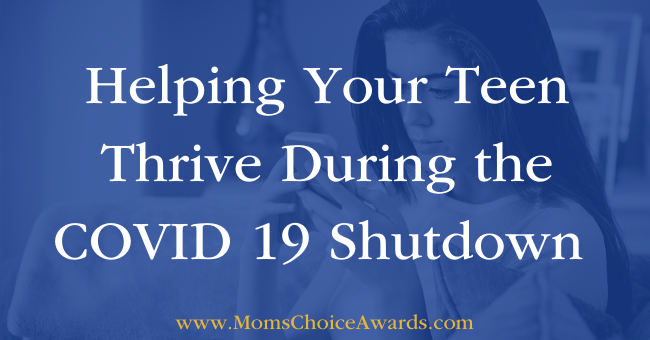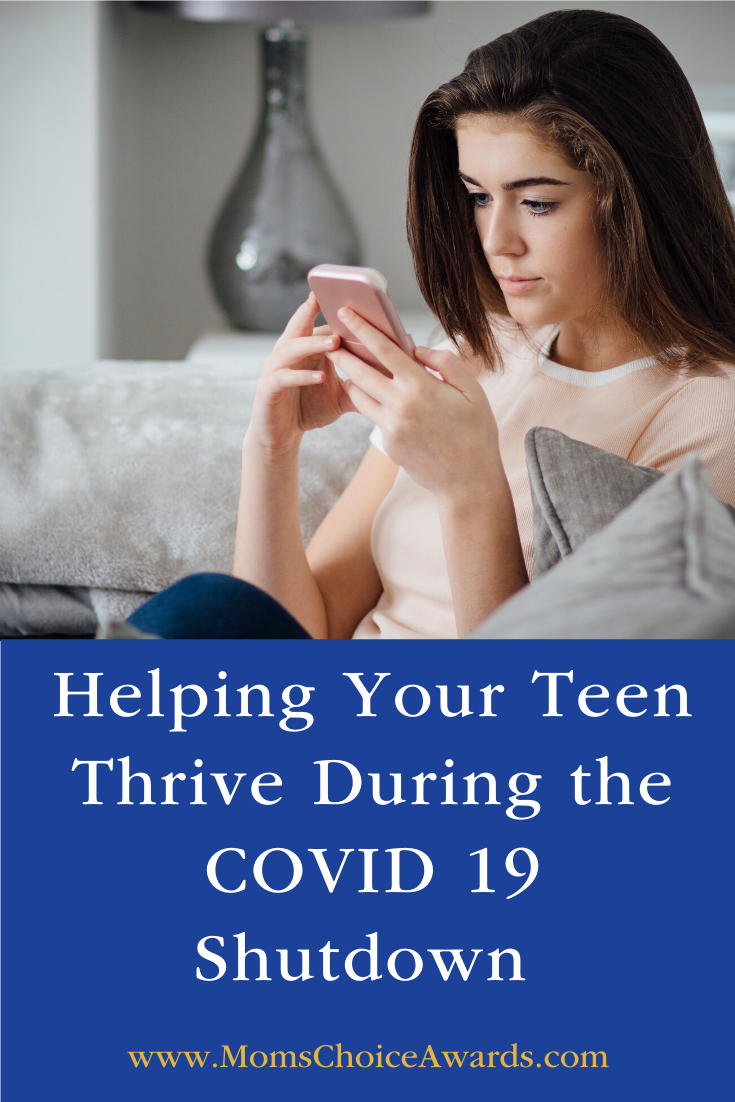 Keith Deltano
Keith Deltano
Educator | Coach | Comedian
Twitter | Facebook
Have Your Teen Create a Calendar
Teens thrive in an environment that includes structure, predictability and stability. COVID-19 and the school closings and stay at home laws have shattered their sense of security. Due to the late-stage development of the prefrontal cortex, the teen brain is chaotic enough on a good day. Given a continuing series of bad days (as many teens consider the pandemic) teens may not handle the sudden changes in lifestyle as well as adults. This assumes you are handling it well, on or off your meds.
Use Calendars and Lists to Get Some Rhythm Back
Try to get them to switch from the phone to an old school style calendar they can write in. You can order one of these online – try to get one with the weekly view (Has seven days shown on two open pages.) That way they will have enough room in each day to make lists, draw pictures, and most importantly, cross out whatever they have achieved for that day. Now, you will probably get from your loving, empathetic and responsive teen, “Why should I keep a calendar or make lists? I’m stuck here and there is nowhere to go and nothing to do.” To which you reply, “Fine (they use that word all the time, why can’t you?) This way you can track the nothing.” Explain to the confused, disorientated and stressed out teen, “Look, what we are going through is hard for you because you have lost control and a feeling of being out of control is tough for you. You are going to plan each day and then execute and cross off what you have done. It will give you a feeling of satisfaction and control even though, in the beginning, it will feel silly.”
Start With Simple Daily Events
Once the calendar comes in (or you create one with a ruler and some paper) start filling it out. Your teen will find out there are some things to put in it for the next day/week. Start with the obvious: wake up, breakfast, clean the dishes, dinner, meeting online with teachers, and whatever else has to happen. You will be putting down the most basic structure of the day: everyday occurrences that have not had to be planned or tracked before COVID. Waking up used to be at the same time because of school, now – without having to go to school – waking up can take place anytime. Going to sleep and waking up at different times is not good for teens (and adults). This connection has been backed up by numerous studies including this one from The Journal of Pediatrics. You are going to impose a wake-up time. It will be a hard sell, but unhappy teens wants to be happy, when they follow what I’m recommending for several days they will be happy, once they get happy they will want to keep doing what makes them happy. Try to make activities occur at the time they used to even though the time parameters for them occurring vanished when school closures and social distancing measures were put in place. For example, if your teen always took the dog out after school, and that was at around 3:30, have them now put in the calendar, “take dog out at 3:30” even though “after school” is no longer happening. The dog will appreciate it as he is as befuddled and stressed out by all this as we are.
Think about what they have lost and how the effect on them will be more pronounced
Think about it, your teen has built their days around a structure that was imposed on them for years by school, sports, habitual social activities, and other outside the home events. They got up at the same time, caught the bus, walked to school or carpooled at the same time, they sat in the same seat in the bus or in the car every morning, they used the same restroom and sat in the same seat in each class. There was a flow to life: sport seasons, the regular end of the school year, graduation, summer jobs and on and on. Your teen may not even know what the word “structure” means, but they had it, and so did you. Now that is all gone. Suddenly gone. And nobody knows when it is going to come back and if it will come back in the same form.
Though they do not know they are fighting for such seemingly mundane things as normalcy and predictability – teens crave the structure they have lost.
Getting your teen to use a daily list/calendar system is a way of restoring that normalcy and sense of accomplishment. There were small victories in their lives pre “shelter in Place”. They got to school, got their homework done, did the things they were supposed to do (except pick up their socks.) And achieved small victories every day. There are none of these little daily victories for your locked down teen. The little things they are so proud of achieving have been robbed suddenly from them. Now you are going to create, with their help, new little things to achieve. You and your teen are going to add a baseline structure – you are going to list mundane things to be achieved. Being able to eat lunch at any time they want is confusing and disorienting if we have been eating lunch at school every day at 11:23. You are going to work out what time breakfast, lunch, and diner is going to be in “stay at home” mode and your teen is going to eat it at that time (as well as help prepare it and clean up). Then you are going to add chores and tasks that regularly take place before COVID 19. Each time they achieve one of these small tasks, they get to cross it out (teens love crossing things out.)
Add something positive to look forward to
Once you get the daily basics filled in, start adding something to look forward to. The challenge is, the usual things to look forward to are off the table due to social distancing, school closures and stay at home laws. During shut down little things need to become big things and put on their calendar. You used to get a shake at the drive-through when your teen was seven and it was a big deal, if he knew it was going to happen he would inquire about this great adventure all day long. Now your teen is not excited about the drive-through shake and will scoff at it when you put it down on his calendar. But now that he has been shut in for weeks, the shake run is a big deal. He will not admit it but on the day it is scheduled he will wake up thinking about it and will be ready ten minutes before the appointed time. The only way the shake run idea could be any better is to make it happen on the same day at the same time every week…oh the joy. By filling his day with events he can predict, can take note of, write down in his calendar and cross off you have saved him from the anxiety empty and unstructured days can produce and given back a sense of control.
Be creative with this “positive” activity. Perhaps it can be a friend(s) over – no more than the allotted limit for your state or region. Perhaps you can purchase that new movie from a streaming service or have a banana split party (of less than ten – including you). Remember, they will make fun of whatever you come up with – and then be glad you planned it and put it on their calendar.
COVID social distancing law: more time for social media and gaming addiction as well as the anxiety and depression that come with it
The link between social media addiction and depression and anxiety has been well established. But there is a way you can use the phone embedded in your teens hand to create structure: Have them plan and implement social media meetings and write these upcoming meetings in his/her calendar. Watching YouTube videos for four hours straight is incredibly unhealthily for teens and humans in general. Meeting with all your friends on Zoom at 10:30 is great. Binging on five hours of “Stranger Things” in a dark room is bad. Scheduling a social media chat with your friends to talk about “Stranger Things” at 11:00 on Thursday is good. The idea is to encourage your teen to use the phone/tablet to interact with others rather just as an entertainment device. These interactions will be scheduled.
Teach your teen to create structure where there is none – use the calendar as a tool to make this happen
The idea is to implant structure into their current structurless existence. Your teen may not be able to do all the comforting things he/she is used to doing, but you are going to work with him to create new comforting rituals. To be comforting they need to happen at the same time and be able to be “achieved.” Lying in bed facing an empty and unstructured day may be relaxing for you (though it never happens) but it will lead to depression, anxiety, and a sense of loss with most teens. Fill the day and use the calendar to fill it. Help your teen find new comfortable patterns during this time and they will learn an even more important skill set they can use the rest of their lives – the power to adapt to difficult situations.
 About Keith Deltano
About Keith Deltano
Keith Deltano is an award winning public educator, parent coach, and internationally touring educational comedian. He is the creator of the character education and anti-bullying curriculum www.CharacterVideo.org.
View all posts by Keith Deltano here.







10 Comments on “Helping Your Teen Thrive During the COVID 19 Shutdown”
Thomas, you are correct. The point is that hey create the calendar with your help. I did not mean to imply that you create it for them and had it to them. It is a process that you work on together and then they run with it independent of you once they show they get the concept of proactively filing up their day. I do this with my own kids and the parents that hire me as a parent coach pre covid.
I was interested in your comment that bored and depressed teens tend to act more irrationally than adults. No one would disagree, but that one statement made me realize how bored, depressed, frustrated, and often downright angry their Dad and I had become. Our own fears and stress combined with quarantining with our teens had contributed to our family’s loosening of control and “vegging out”
Following your suggestions, my husband and I sat down together and made a calendar of our own, including specific goals and activities outside our usual routine. We tried to be creative; then helped our three boys make calendars to jive with ours. We made sure that everyone had time to “do their own thing”, but also ended up with family game times, some fitness goals to work on together and a kitchen routine involving all of us. The fact that everyone in our family has control over their own schedules and obligations, as well as built-in family time and private time makes calendar-keeping cool. It’s been only few days, but so far, so good! Thanks for your suggestion. We may even vote to continue this routine after Covid 19.
It is amazing how small changes can yield big dividends. I’m glad you are having a positive experience with it. A few of the families I have worked with go through a kind of shock – then are able to work together. By working together on planning the upcoming week you avoid the drama that can come when nobody knows what is going on – “Honey, I thought your had your tela conference at seven tomorrow? I can’t watch the little one now” Then your teen walks in and says, “I need the laptop to do my zoom ballet class.” Then your son walks out of his bedroom, controller in hand with that dazed “gaming for 8 hours straight” look, and grunts, “What is everyone yelling about” then your daughter twirls on him and says, “You know I need the wifi for my zoom class, get off your game!” And then your son yells, “I didn’t know about your stupid ballet zoom class and I can’t stop now or I’ll loos my weaponry level!” and then your youngest wanders in and says something like, “Whats for supper?” and then….
Good advice on providing structure. One point is don’t ust create a calendar or schedule FOR them, do it WITH them. Having some say in the process will likely make them buy-in more. Also, don’t forget to schedule recess (exercise).
Boredom and depression are dangerous. Bored kids do things they would not otherwise do. Because they don’t have a prefrontal cortex just yet (the part of the brain that does risk analysis) bored and depressed teens tend to act more irrationally (sex, drugs, alcohol, vaping and all the other stuff we lie in bed worrying about) than bored and depressed adults. Remember, her “back on track” may not be the same as your “back on track.” My daughter (see reply to the above comment) decided she wanted to be a fireman (now firewoman.) The next thing I know she is scheduling workouts to get ready for the fire academy. One day she said, “Dad, let’s go to the track tonight.” She put it on her calendar and mine. I grab my youngest son and we go to the high school tack – it is opened and folks are working out but following social distancing guidelines – and she puts me in a fireman’s carry and starts walking then jogging around with me on her back. Then she throws my youngest son on her back and starts sprinting around….not what I planned when I encouraged her to redirect but, once again, better than vegging on social media and video games…
These are amazing tips and so appreciated right now. Being a teen during this pandemic is so hard. I remember wanting every excuse not being home because being with my parents weren’t the cool thing to do. LOL
You are right – you did not want to be with your parents – but deep down you did….I’m building a fish pond with my 13 year old during the lock down. He got this idea form somewhere he wants a fish pond. He put the research in and presented the idea to me. I’ts basically a hole in the ground with a liner so we can afford it. We put it on the calendar and a few days ago I’m out in the backyard digging next to my son in the mud. It was hard digging. I wouldn’t trade it for anything. I have to work, but everyday since he has put on his calendar to “work on the hole” and he has hardly picked up a controller. Why would you play military video games when you can dig an actual bomb crater in the back yard. Tonight we have scheduled to “study” what is next (I have no idea what I’m doing) in the pond process. So we are going to sit together and watch YouTube videos and take notes on how to stop this crater from becoming a swampy mess. We are using the COVID lockdown and imposed structure to create a positive memory (I hope) that will last a lifetime.
so much great info. its hard times for the young folks. a rough road
Donna, you are right. It is hard times. My daughter is a Senior and she lost prom, the celebrations, graduation, relatives visiting, and her Senior Year ballet performance. They were going to do “Unto The Woods.” Out of all of them, the dance performance hurts the worst. She has been dancing for 13 years and had a lead part. She does not go to an ordinary dance school (it’s kind of a high cost high performing cult) – they perform in a college auditorium and it’s a big deal. It’s not going to happen. However, she is doing GREAT. She is filling up here time and got a job at a bike shop (they are essential because people use bikes to get to work and need to be be to get them fixed. ) So, she lost her job at a restaurant and…got a job at a bike shop. She is filling her day by working out, working at the bike shop, dong the uninspiring online classes, taking her little brother biking, and on and on. She is “working her calendar.” She is not devastated by what has happened to her because she does not have the time to be. Though, like all of us, we are imperfect parents, my wife, Julia, and I have worked hard to build resilience in our kids and the effort is paying off. Whatever you do, don’t let them veg on the couch and play video games…..
I found this article very helpful, definitely going to put these strategies to use, starting in the morning. My daughter has been struggling lately and depression and boredom is setting in. Thank you!! You have some fantastic ideas to get her back on track!